| Srl | Item |
| 1 |
ID:
122494
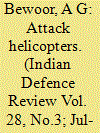

|
|
|
|
|
| Publication |
2013.
|
| Summary/Abstract |
The Attack Helicopter has value for money in a relatively benign environment for short, swift Special Operations where the opposition has restricted ability to interdict the AH. Other countries have huge air arms for each Service, some of which are now closing down. There is no justification for India to mimic defunct, untried and indeed failed strategies developed for European and Middle East scenarios. This approach may mislead us into a weapons procurement minefield. Thereafter, wasteful expenditure will hamper us from getting what we really need for India's safety and security.
|
|
|
|
|
|
|
|
|
|
|
|
|
|
|
|
| 2 |
ID:
051708
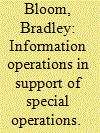

|
|
|
|
|
| Publication |
Jan-Feb 2004.
|
|
|
|
|
|
|
|
|
|
|
|
|
|
|
|
| 3 |
ID:
092452
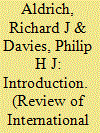

|
|
|
|
|
| Publication |
2009.
|
| Summary/Abstract |
Despite the advent of a UK National Security Strategy in 2008, there has been surprisingly little public discussion of the long-term future of the intelligence and security services, together with cognate subject of special operations.
|
|
|
|
|
|
|
|
|
|
|
|
|
|
|
|
| 4 |
ID:
133940
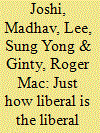

|
|
|
|
|
| Publication |
2014.
|
| Summary/Abstract |
This article assesses the extent to which the liberal peace (the dominant form of internationally supported peacemaking) actually deserves the sobriquet 'liberal peace'. In recent years, an intense debate emerged on this question as critics of the critique of the liberal peace have sought to downplay the dominance of the liberal peace. These debates are interesting but they are mainly based on qualitative analysis supplemented with some case study material, and often rely on assertions rather than evidence. This article seeks to add to this debate with simple aggregate data from the Peace Accords Matrix that is comprehensive and comparative. The article constructs a five-part framework to analyse the liberal elements of peace accords liberalism and then tracks the extent to which the elements of the framework are found in peace accords. Through this examination, it is found that the liberal peace is indeed the dominant form of peace-support intervention, although there are considerable variations in the extent and implementation of the liberalism in peacebuilding.
|
|
|
|
|
|
|
|
|
|
|
|
|
|
|
|
| 5 |
ID:
133587
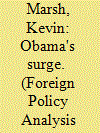

|
|
|
|
|
| Publication |
2014.
|
| Summary/Abstract |
This study examines the decision-making process leading to President Barack Obama's decision to order a troop surge in Afghanistan in December 2009. I analyze the decision-making process according to the precepts of the bureaucratic politics model and conclude that the bureaucratic politics model provides a compelling and descriptively accurate account of the Afghanistan surge decision-making process. Actors' policy preferences were influenced by consideration of bureaucratic role and position within government, significant examples of political activity occurred throughout the strategy review, and the ultimate decision was a political compromise.
|
|
|
|
|
|
|
|
|
|
|
|
|
|
|
|
| 6 |
ID:
132243
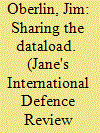

|
|
|
|
|
| Publication |
2014.
|
| Summary/Abstract |
US Special Operational Command (USSOCOM) stepped towards the realization of the special operations forces tactical communications (STC) system in May, with the publication of the draft solicitation for a two channel handheld radio with full-motion video receiver capability.
|
|
|
|
|
|
|
|
|
|
|
|
|
|
|
|
| 7 |
ID:
133511
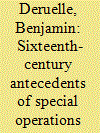

|
|
|
|
|
| Publication |
2014.
|
| Summary/Abstract |
The first conceptual, theoretical treatises about small war (la petite guerre) as special operations appeared only from the middle of the seventeenth century. The term is not used in the eighteenth-century sense of 'special operations' in older sources. The supposed absence of any treatment of the subject is surprising considering the obsession with the 'art of war' in the Renaissance, but other authors attribute it to a supposed antinomy between chivalric ideals and irregular warfare. But the absence of explicit manuals on the subject is not evidence of absence of advanced reflection on this kind of operations in the Middle Ages and in Early Modern times. We should thus look elsewhere, in other genres, for writings that contain and pass on military knowledge. Epics, romances, educational and military treatises, and memoirs in fact contain elements of a theory of special operations, even though these genres differ from our conception of rationality inherited from the Enlightenment.
|
|
|
|
|
|
|
|
|
|
|
|
|
|
|
|
| 8 |
ID:
121971
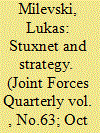

|
|
|
| 9 |
ID:
098745
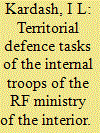

|
|
|
| 10 |
ID:
133531
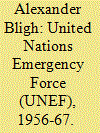

|
|
|
|
|
| Publication |
2014.
|
| Summary/Abstract |
With the conclusion of almost every round of hostilities between Israel and one of its neighbours the idea of international forces is being raised once again. This is basically an improved and revised initiative for stationing international forces to supervise (and perhaps impose) a ceasefire between the parties. In the Arab-Israeli framework, it is in essence the old approach which has been in service since 1948. Only one force, UNEF, stands out as not having been approved by the Security Council and clearly failing its intended but vaguely defined mission. The current analysis leads to the conclusion that in this particular regional conflict, the positioning of international forces must always come within the context of a more comprehensive settlement. That way, by violating a force's mandate, each party would lose either land or diplomatic recognition. Moreover, if a Middle Eastern peacekeeping operation is to take place in the future, it has to include organic units of the warring parties, encouraging peaceful interactions. Such units should reinforce organic units from countries acceptable to all parties. Hopefully, future missions, taking into consideration some of the approaches suggested here, can continue to contribute to regional processes for peace.
|
|
|
|
|
|
|
|
|
|
|
|
|
|
|
|